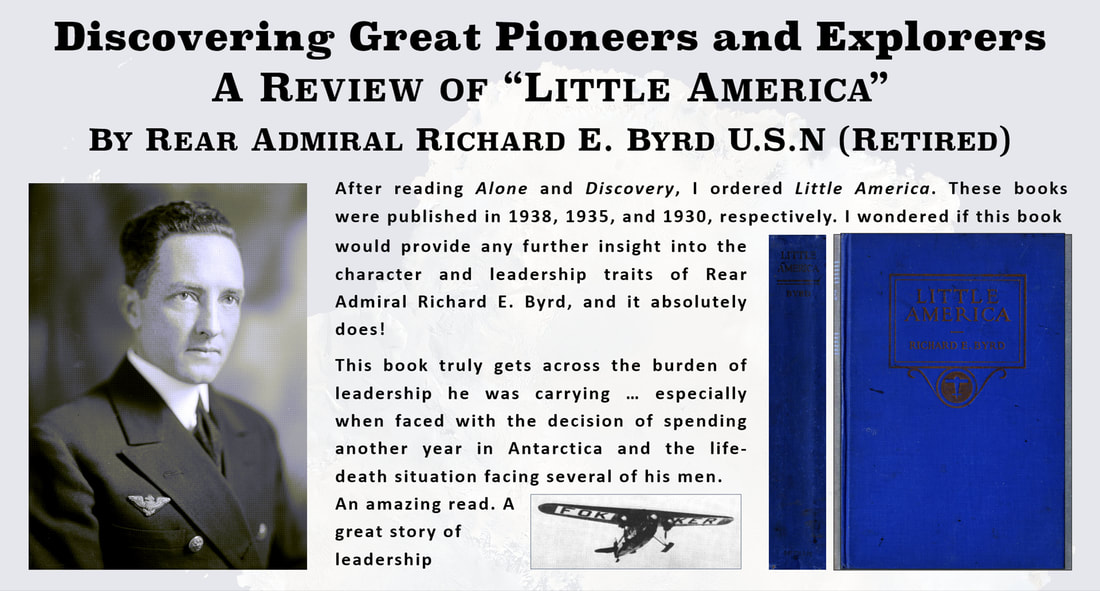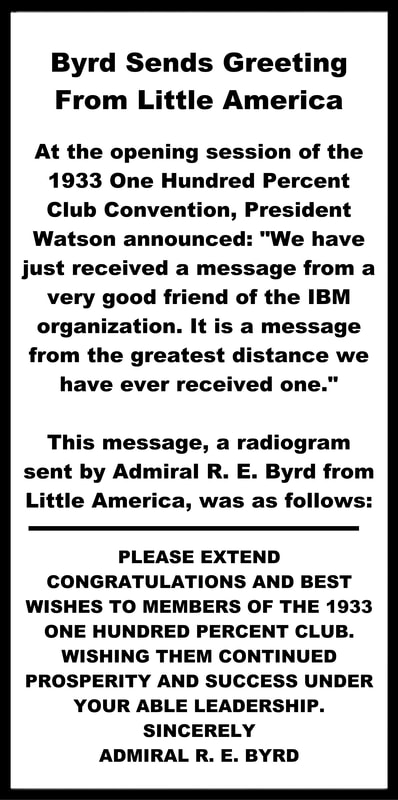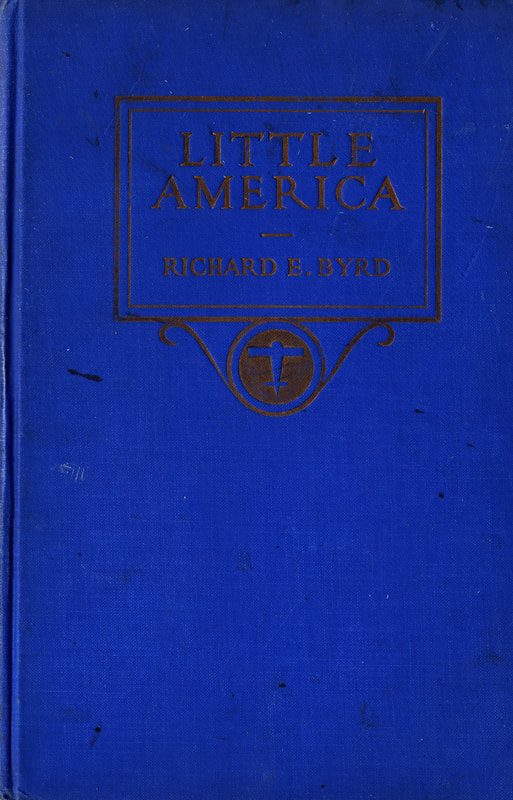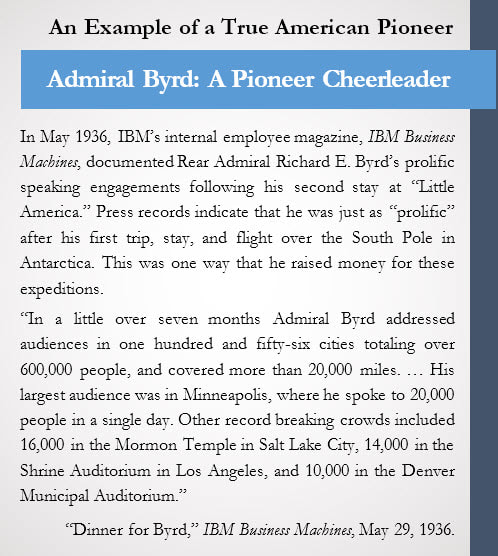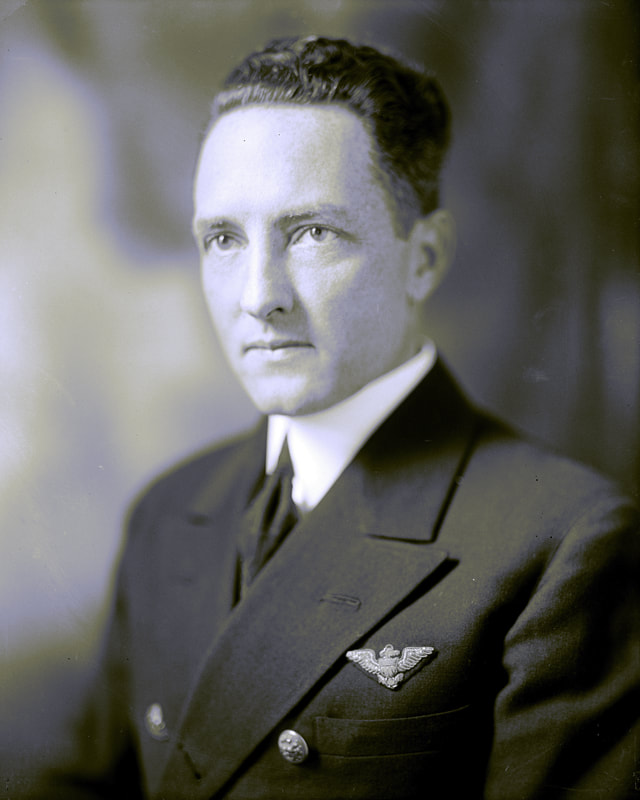A Review of "Little America" by Admiral Richard E. Byrd
|
|
Date Published: September 30, 2023
|
“If Rear Admiral Richard E. Byrd … had not missed his train in London, England, some years ago, his magnificent expedition to the bottom of the world would not have been made—at least by him.
“When England notified the U.S. that she was ready to deliver the giant airship ZR-2 to our government, Byrd was assigned by the secretary of the navy to … serve as navigating officer on the voyage over the Atlantic with its British crew. … Byrd arrived in ample time, … but he had no control as the train pulled out of the London terminal without him. … He missed the ZR-2’s sailing by a small margin. He was just in time to see the great ship crash down from the sky in flames … with a loss of lives that shocked the world. …
“As surviving ranking officer Byrd took charge of the rescue work with such efficiency and vigor that he was publicly commended by the secretary of the air ministry of Great Britain.”
“When England notified the U.S. that she was ready to deliver the giant airship ZR-2 to our government, Byrd was assigned by the secretary of the navy to … serve as navigating officer on the voyage over the Atlantic with its British crew. … Byrd arrived in ample time, … but he had no control as the train pulled out of the London terminal without him. … He missed the ZR-2’s sailing by a small margin. He was just in time to see the great ship crash down from the sky in flames … with a loss of lives that shocked the world. …
“As surviving ranking officer Byrd took charge of the rescue work with such efficiency and vigor that he was publicly commended by the secretary of the air ministry of Great Britain.”
“Expedition of Byrd Made Possible by Twist of Fate,” The Sheboygan Press, 1930
A Review of “Little America” by Richard E. Byrd
- Reviews of the Day: 1930–31
- Selected Insights from “Little America”
- This Author’s Thoughts and Perceptions
Reviews of the Day: 1930–31
As you will read in the “Reviews of the Day” captured below, Admiral Richard E. Byrd was as respected for his composure, humility and leadership as for this, his first exploratory trip to Antarctica and a flight over the South Pole—the first of its kind. It is the story not only of the exploration but of all the planning it took to pull it off without the loss of life.
It was an amazing effort that is well captured in these reviews.
It was an amazing effort that is well captured in these reviews.
|
“In the midst of a busy day here, Rear Admiral Richard E. Byrd found time to give a brief interview to two persistent youngsters for their school paper. As he dismissed them, he remarked, ‘I am sorry to have kept you waiting.’ Little incidents of this kind help to explain an interesting feature of the Byrd polar expeditions—the cordial relations which existed between the admiral and his associates throughout the venture. …
“The patience, consideration and courtesy of Admiral Byrd must have been a big asset to his party. “Similar qualities are a big asset to the ordinary affairs of life.” “Byrd’s One-Man Expedition,” Althea Daleske
“Richard E. Byrd Is a Courteous Hero,” The Minden Nebraska Courier, 1930 “Little America is one of the most exciting books of our memory, for it records the battle against what has previously been the unconquered almost cosmic force of icy death, and the frail forces of man’s spirit and invention. … It is the story of man’s utilization of all of the weapons that civilization and science have given him against the force of the elements. … The story is beyond description, thrilling and gripping. … The momentary chance that the two boats would never reach the ice barrier keeps the reader tingling with excitement.”
|
In early 1934, Admiral Byrd sent this message to IBM’s 1933 One Hundred Percent Club. From IBM Business Machines Newspaper.
|
Fanny Butcher, “Hero’s Calm Adds Thrills to His Deeds,”
The Chicago Daily Tribune, 1930
The Chicago Daily Tribune, 1930
“There has not been a popular hero since Lindbergh who has so filled the public eye and gripped the imagination as Admiral Byrd. … ‘Little America’ reveals that Admiral Byrd and his men never scorned the experience of others. Indeed, every word and experience left by men who had previously been to the Antarctic region appear to have been most carefully scanned and thought upon. Some of our officials in public office would do well to take a leaf out of the Byrd book in that respect. …
“Byrd apparently absorbed and was guided by every possible suggestion of men who had gone before him. He was not a copyist but he was apparently open to all suggestions during his time of preparation.”
“Byrd apparently absorbed and was guided by every possible suggestion of men who had gone before him. He was not a copyist but he was apparently open to all suggestions during his time of preparation.”
Editorial, “Byrd’s Full Story is Out,” The Lansing State Journal, 1930
“The many newspaper stories that have appeared about the Byrd Antarctic Expedition haven’t begun to exhaust the thrilling reading. … It is the more leisurely account of significant little details that keeps one’s attention fixed on this book. … ‘real summer weather, 27 degrees above zero,’ the dogs, the ever-amusing penguins, the social life at camp, … and more. …
“One feels ashamed that a group so efficient, so constructively engaged, should have had to experience the humiliation of debts and begging for the $800,000 involved. … ‘Little America’ is a book to renew one’s faith in the sublimeness of human nature. When the course of events in the day’s news, fills one with sordidness and the realization of so many little men—at times even in big places, can infest a great and inspiring land like this filling it with pessimism and despair, Admiral Byrd’s book brings the stuff to keep one’s courage and renew one’s optimism.”
“One feels ashamed that a group so efficient, so constructively engaged, should have had to experience the humiliation of debts and begging for the $800,000 involved. … ‘Little America’ is a book to renew one’s faith in the sublimeness of human nature. When the course of events in the day’s news, fills one with sordidness and the realization of so many little men—at times even in big places, can infest a great and inspiring land like this filling it with pessimism and despair, Admiral Byrd’s book brings the stuff to keep one’s courage and renew one’s optimism.”
Sidney Williams, “The Human Side of the Byrd Expedition,” The Philadelphia Inquirer, 1930
“Rear Admiral Richard E. Byrd will sell autographed copies of his book, ‘Little America’ to aid members of his crew who accompanied him to the Antarctic and have not found employment.
“It is expected the autographed copies will bring $50.00 a volume.”
“It is expected the autographed copies will bring $50.00 a volume.”
“Byrd Book Sales to Aid his Crew, The Miami News, 1931
Selected Insights from "Little America"
- Admiral Byrd Writes on Preparation, Preparation, and then … More Preparation
|
“We have been stimulated by the knowledge that the battle ahead in the frozen world will be won or lost by the battle of preparation. We are not done yet—not by any means. There is still an immense debt—I owe more money than I used to think existed. … [Admiral Byrd funded these expeditions through his tours, book signings, and begging donations from sponsors].
“We have done our best; if something is forgotten, some trifle necessary to the support of eighty-two men, for nearly two years, then it will have to be one of those things with which Providence bedevils humans who reach out for too much. For we have estimated, calculated, and considered until heads whirled; we have divided and sub-divided to the nth degree; we have laid out our plans on a cosmic order, setting up, as it were, an ideal scheme—an expedition equipped with the most nearly perfect instruments for gathering information in the most efficient and modern way; and these plans we have painfully contracted into the narrower, more modest limits fixed by the funds at our disposal, surrendering first of all the luxuries, the relatively least essential, until we got down at last to the hard rock level of irreducible minima.” - Admiral Byrd Separated His Personal Life from His Pioneering Adventures |
Admiral Byrd’s personal account of his first expedition to Antarctica in 1929-30, and his flight over the South Pole.
|
“For the millionth time I have been pressed to draw my family and home life into newsprint. We do not want to do this. Marie is averse to publicity, and I must say that the reporters have been fair. However much they beg her and however provoked they may become over her steadfast refusal to be interviewed or, as one said, ‘humanized,’ they nevertheless respect her attitude; she and the children now bear an almost charmed freedom from the camera.
“I have had reason on a hundred occasions to note the high sense of fairness and honor among newspapermen. Not a few of them have shared my confidence; none has yet deliberately broken it.”
[Would today’s newspapermen and -women be as honorable … not to mention social media’s talking heads?]
“I have had reason on a hundred occasions to note the high sense of fairness and honor among newspapermen. Not a few of them have shared my confidence; none has yet deliberately broken it.”
[Would today’s newspapermen and -women be as honorable … not to mention social media’s talking heads?]
- Admiral Byrd Writes on His Maniacal Focus on “Preparation"
“In polar expeditions … the amount of preparation and adventure are inversely proportional [summarized]. There is a saying among explorers that ‘the more the amateur the greater the adventure.’ ”
- Admiral Byrd Writes About Carrying the Responsibility for these Expeditions
“Past expeditions, as large as ours, were usually supported wholly or in large part, by governments, or divisions of governments; whereas responsibility for the financing of this one is centered in a single man [Admiral Richard E. Byrd]. The raising of money for polar expeditions is always difficult. I have never known an explorer who wasn’t either bankrupt or close to it. …
“Yet, better a thousand times, to face ruin [bankruptcy] in New York than accept the dreadful responsibility of starting south lacking a single bit of equipment, no matter what the cost, necessary for the safety of the men. …
“On the North Pole flight and this Antarctic expedition, the responsibility has been entirely mine. Responsibility for debts, mistakes, plans, execution of work and what is vastly more important—responsibility for the safety of the men involved—has fallen wholly upon a single pair of shoulders. … There are more than four score men on this expedition, ranging in age from 18 years to sixty-eight, from seamen to scientists. For every one of them I have a deep sense of responsibility.
“I shall carry that responsibility with me, without relief, for nearly two years.”
“Yet, better a thousand times, to face ruin [bankruptcy] in New York than accept the dreadful responsibility of starting south lacking a single bit of equipment, no matter what the cost, necessary for the safety of the men. …
“On the North Pole flight and this Antarctic expedition, the responsibility has been entirely mine. Responsibility for debts, mistakes, plans, execution of work and what is vastly more important—responsibility for the safety of the men involved—has fallen wholly upon a single pair of shoulders. … There are more than four score men on this expedition, ranging in age from 18 years to sixty-eight, from seamen to scientists. For every one of them I have a deep sense of responsibility.
“I shall carry that responsibility with me, without relief, for nearly two years.”
- Admiral Byrd on Choosing the Right “Men” for an Expedition
“Men are at once the strongest and the weakest links in the chain. The performance of machinery in the face of given conditions can be anticipated with accuracy; but what men will do is past prophecy. The man who Scott [Robert Falcon Scott, British officer and explorer] thought would outlast all others was the first to collapse.
“The idea of selecting men according to their faces alone is one of the most fantastic notions yet swallowed by the race. Whoever claims to be able to judge his fellow men by their faces is an optimist. The face shows certain things, it is true, but you must live with a man for a long time, see him as he stands and thinks in relation to rapidly altering conditions; and even then, you have no certainty: only the probability that he will act in the future as he did in the past. …
“The men, save for the handful who served me on other expeditions, were taken according to their records and abilities.”
“The idea of selecting men according to their faces alone is one of the most fantastic notions yet swallowed by the race. Whoever claims to be able to judge his fellow men by their faces is an optimist. The face shows certain things, it is true, but you must live with a man for a long time, see him as he stands and thinks in relation to rapidly altering conditions; and even then, you have no certainty: only the probability that he will act in the future as he did in the past. …
“The men, save for the handful who served me on other expeditions, were taken according to their records and abilities.”
This Author’s Thoughts and Perceptions
I did not read Admiral Richard E. Byrd’s books in chronological sequence. When I picked up “Little America” which was published in 1930, I did not anticipate learning anything more about the character and leadership traits of this man, this great explorer and pioneer, than I had read in “Discovery”—published in 1935 and “Alone”—published in 1938.
I was wrong.
I was wrong.
|
In the area of seeing his leadership in action these two chapters stand out from all the rest:
- Admiral Byrd’s Observations on Leadership Principles “We had the privacy of gold fish and elbow room of sardines. …
“It was like groups of men in a club, separating and drawing together by the action of common interests, likes and dislikes. There was always a large group for, and often a small minority against, the policies of the camp. There was always a suggestion of internal politics in this minority never too concealed—just enough to make it interesting. |
Admiral Byrd won the public’s hearts and minds through personal interactions and sharing of his experiences from expeditions to both poles.
|
“And thus, in a rudimentary form, and without definite intention, we democratized the government of Little America, which was often satisfactory to all, and sometimes not, which is the unhappy destiny of all governments. …
“There were passing irritations, of course—most of them mild, a few intense. Some, it is true, lasted a long time. One man may have talked too much to the occasional distaste of several of his fellows. Another had an ungovernable tendency to lose everything he needed the next moment, and would turn the camp topsy-turvy until he recovered it. And still another insisted on telling long, elaborate and (to many) pointless yarns.
“One or two men were undeniably lazy and this was irritating to all hands. The great balancing force was the strength of loyalty that infused the organization. Even the lazy man sincerely and keenly wished the expedition to succeed and I should prefer a laggard who sincerely liked his expedition to an energetic man who is unable to give loyalty to anything—not even himself. There are such men, but fortunately we had none of them. Otherwise, our government could not have lasted.
“But show me a group of men who have lived for a year in unbroken harmony, whose gorges have failed to rise ever so faintly at these very same nuisances or similar ones, and I shall have the doubtful privilege of seeing inhuman dolts.”
“There were passing irritations, of course—most of them mild, a few intense. Some, it is true, lasted a long time. One man may have talked too much to the occasional distaste of several of his fellows. Another had an ungovernable tendency to lose everything he needed the next moment, and would turn the camp topsy-turvy until he recovered it. And still another insisted on telling long, elaborate and (to many) pointless yarns.
“One or two men were undeniably lazy and this was irritating to all hands. The great balancing force was the strength of loyalty that infused the organization. Even the lazy man sincerely and keenly wished the expedition to succeed and I should prefer a laggard who sincerely liked his expedition to an energetic man who is unable to give loyalty to anything—not even himself. There are such men, but fortunately we had none of them. Otherwise, our government could not have lasted.
“But show me a group of men who have lived for a year in unbroken harmony, whose gorges have failed to rise ever so faintly at these very same nuisances or similar ones, and I shall have the doubtful privilege of seeing inhuman dolts.”
|
Little America (1930) is worth reading even if done after Discovery (1935) and Alone (1938). The book provides more insightful depth into the character of Admiral Richard E. Byrd and his team; it provides more perspectives into his philosophy of leadership and preparation; and the story of the flight over the South Pole stands on its own as an adventure story.
A highly recommended adventure story that is true … not some fiction supposedly based on fact. As a society, we need to resurrect some of our 20th Century American heroes. Individuals like Admiral Byrd, who have an internal heroism and a supreme confidence in themselves that is tempered with heart and humility. As one reviewer wrote above, "When in the course of a day’s news—one which makes an individual realize that so many little men in big places infest this great and inspiring land of ours with pessimism and despair, Admiral Byrd’s book buttresses one’s courage and renews one’s optimism.” Cheers, - Peter E. |
